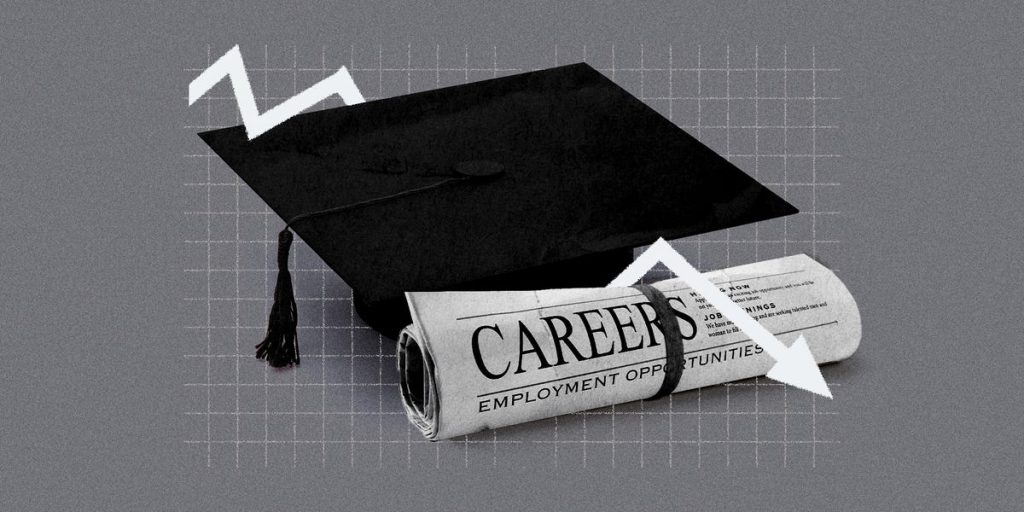The Struggling Job Market for MBA Graduates: A Growing Concern
The job market for MBA graduates has become increasingly challenging in recent years, marking a shift from the once promise of secured employment. Even top-tier business schools like Harvard, Yale, and Stanford are not immune to this trend. Economists and experts suggest that a combination of factors, including elevated interest rates, economic uncertainty, and the rise of artificial intelligence (AI), has led to a slowdown in white-collar hiring. This has left many MBA graduates, once considered prime candidates for high-paying roles, struggling to secure employment. For some, like Joshua, who graduated from Santa Clara University in 2021, the reality is living paycheck to paycheck while working at Starbucks and searching for a marketing job. His story reflects the harsh reality many graduates face in a competitive and uncertain job market.
The slowdown in hiring has been particularly evident in industries that traditionally attract MBA graduates, such as finance, technology, and consulting. Companies in these sectors are either downsizing or turning to AI to reduce costs. As a result, MBA graduates are finding themselves competing for fewer positions, often with lower salaries than expected. The decline in job acceptance rates at top business schools further underscores this trend. Business Insider analyzed data from the top 15 MBA programs ranked by U.S. News and World Report and found that job acceptance rates three months post-graduation were at their lowest for the class of 2024 in eight out of ten schools. This dip highlights the broader challenges faced by MBA graduates in securing employment in a slowing economy.
Economic Uncertainty and the Role of Artificial Intelligence
The current economic climate, marked by elevated interest rates and uncertainty, has played a significant role in the hiring slowdown. Higher interest rates have made borrowing more expensive, leading companies to cut back on hiring and invest in cost-saving technologies like AI. Kory Kantenga, head of economics at LinkedIn, notes that industries such as finance, tech, and consulting, which are key employers of MBA graduates, have been particularly affected. Instead, sectors like healthcare, government, and hospitality have seen more robust hiring since 2023. However, these industries may not align with the career aspirations of many MBA graduates, who often aspire to roles in high-paying sectors.
The rise of AI has further complicated the job market. Companies are increasingly relying on AI tools to perform tasks that were once handled by human workers, reducing the need for certain roles. Economist Lisa Simon of Revelio Labs points out that jobs with high returns to AI, such as software engineering and data analysis, are seeing the biggest declines in demand. This shift has left many MBA graduates, who may have expected to fill these roles, struggling to find relevant positions. Additionally, companies that ramped up hiring during the pandemic are now being more cautious, having experienced the financial strain of layoffs in recent years.
The Personal Toll of the Hiring Slowdown
The impact of the hiring slowdown is not just economic; it also takes a personal toll on MBA graduates. Dan Trujillo, an Executive MBA graduate from the University of Colorado, was laid off from his role as a director of customer experience in January. He has since applied to 25 to 30 management positions without success, receiving only rejection emails. His story is not unique. Many MBA graduates are finding it difficult to land roles that match their skills and expectations, leading to frustration and financial strain.
The emotional and professional challenges faced by these graduates are compounded by the perception that they are falling behind their peers. Joshua, who earned his MBA in 2021, expressed feelings of stagnation as he watches his classmates advance in their careers while he struggles to secure a job in his field. The pressure to repay student loans and maintain a certain lifestyle adds to the stress. For many, the once-promising investment in an MBA now feels like a burden.
Looking Ahead: Potential Silver Linings
While the current job market is undeniably challenging for MBA graduates, there are some potential silver linings. Economists and experts point to several factors that could improve the labor market in the coming years. One key development is the possibility of Federal Reserve interest rate cuts, which could help stimulate hiring. According to CME FedWatch, there is an 84% chance that interest rates will be lower by the end of the year. Lower rates could make borrowing cheaper for companies, potentially leading to increased hiring.
Another factor that could work in favor of MBA graduates is the uptick in retirements among baby boomers. Satyam Panday, chief US and Canada economist at S&P Global Ratings, notes that the gap left by retiring workers may not be fully filled by AI, creating opportunities for MBA graduates to step into leadership roles. Audrey Guo, an assistant professor of economics at Santa Clara University, adds that companies will still need to invest in developing future leaders, even as they rely on AI for certain tasks. This could create a pipeline for MBA graduates to advance in their careers.
The Road to Recovery: Navigating the Changing Job Market
The road to recovery for MBA graduates will likely require a combination of patience and adaptability. While the labor market may improve in the coming years, the landscape is unlikely to return to what it was just a few years ago. Companies are increasingly cautious about hiring, and the rise of AI has permanently altered the job market. MBA graduates will need to be proactive in positioning themselves for success, whether by acquiring new skills, exploring different industries, or being open to non-traditional roles.
For now, many MBA graduates are holding onto hope that the job market will improve. The potential for interest rate cuts, an uptick in retirements, and the continued need for human leadership in certain sectors offer reasons for optimism. While the current reality is undeniably tough, it is not without hope. As the economy continues to evolve, MBA graduates will need to remain resilient and adaptable, leveraging their skills and knowledge to navigate the challenges and opportunities of the changing job market.












